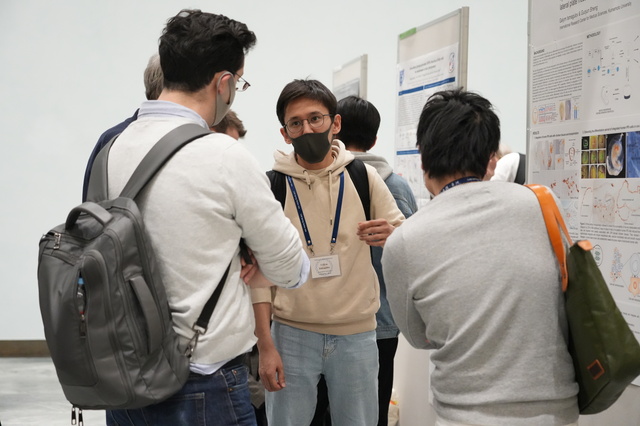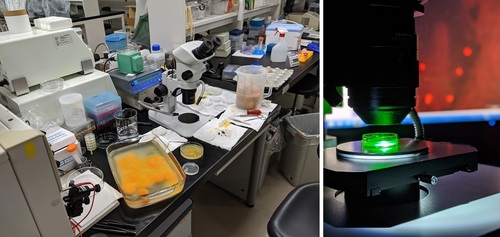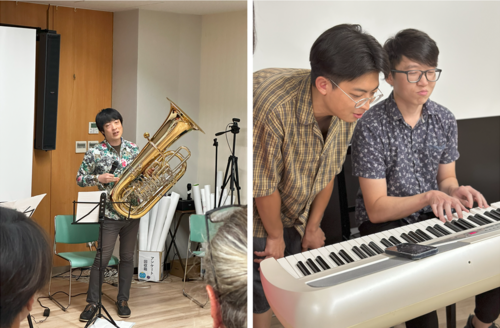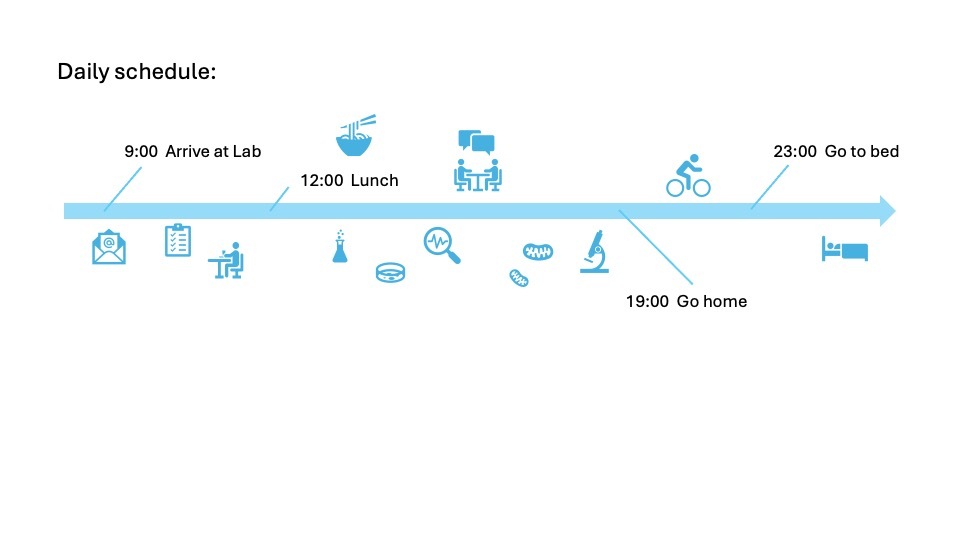- HOME
- Education
- Student's Voice
- 【Student life】Mr. Galym Ismagulov (Laboratory of Developmental Morphogenesis)
Student's Voice

Name: Galym Ismagulov
Country:Kazakhstan
Lab: Laboratory of Developmental Morphogenesis
I am a Ph.D. candidate in the laboratory of Developmental Morphogenesis. I am interested in understanding how three principal germ layers (ectoderm, mesoderm, endoderm) are generated during gastrulation, with a particular focus on the development of a chicken embryo-based system to study human iPS cell differentiation to study three closely related cell lineages, the blood, endothelial and smooth muscle cells in vivo. Currently, my primary focus is on human iPS cells that have a genetic mutation important during first phases of epithelial-to-mesenchymal transition (EMT) in the early development. I am investigating the behavioral differences between wild type (WT) iPS cells and those carrying a genetic mutation after transplantation and in culture. I am also excited about the morphogenesis of extraembryonic tissues, cancer microenvironment and mechanisms of developmental arrest across species.
While most of us follow a typical 9-to-5 rhythm, our daily routines are shaped by experimental timelines. We usually come to the lab around 9 and start the day by checking the emails, preparing necessary documentation and checking experimental timelines. I am more focused during the morning, so I usually try to finish demanding experiments before noon. Afternoons are mostly spent doing experiments that require longer time or analyzing data. Lunchtime offers a great opportunity to connect with labmates or colleagues from neighboring labs--we often exchange ideas, discuss our ongoing projects, and share updates on both professional and personal fronts. I aim to wrap up my lab activities by 7:00 PM, yet sometimes we can stay late nights to finish up everything.
Q1. Can you introduce yourself?
My name is Galym Ismagulov, and I am from Kazakhstan (Aktobe). I got my Bachelor's degree at Nazarbayev University with a major in Biological Sciences. Later, I continued to pursue Master's degree at Kumamoto University in the laboratory of Developmental Morphogenesis. During the midst of the pandemic, I decided to pursue a Ph.D. in the same lab. I continued to work on the chimeric model and assisted in several other projects related to cold torpor, cancer microenvironment and chorioallantoic membrane (CAM) morphogenesis. In my spare time, I like to travel, cook and go on long-distance cycling trips. I am a proud cat owner and enjoy spending relaxing time with my cat after work.
Q2. What do you study?
I am interested in the molecular and cellular mechanisms of the early developmental process conserved throughout animal kingdom - gastrulation. During gastrulation, cells of an epiblast layer undergo epithelial-to-mesenchymal transition and give rise to three germ layers (ectoderm, mesoderm, and endoderm). Each of these layers further differentiate to form functional tissues and organs of a developing embryo. Although, it has been studied extensively in many animal species, how human cells behave and differentiate during this critical step is still unclear. This is in part due to ethical and technical difficulties studying human embryos. Using chick as a main model, I am interested in developing a system that will enable us to understand the differentiation potential of human pluripotent stem cells in vivo during initial germ layer patterning, and how they integrate with host embryonic environment. For now, I am focused on elucidation of the feasibility of this approach and differentiation of various human iPS cell lines into lateral mesoderm derivatives (hematopoietic, muscular and angiogenic lineages).

Q3. What was your most memorable experience during your time at IRCMS?
My most memorable experience in IRCMS would definitely be happy hours, during which everyone at the institute will gather to have fun together. It helps not only to relax and distract from the research routine but also provides opportunities to share ideas and build collaborations. Sometimes members of IRCMS or their friends will play musical instruments, sing, or share their culture and talents. It allows to build a strong atmosphere of the community and friendship between all the members of IRCMS.

Q4. What is your future plan?
After completing my PhD, I want to continue my research career as a postdoc in developmental biology field. I want to learn more about other model systems and try to explore evo-devo aspects of developmental morphogenesis and arrest.
Q5. What do you enjoy most about your research?
There are many things to be happy about doing research. I mostly enjoy observing the chicken embryos. You can see every stage of chicken development, label and trace the cell movements in living, intact embryos from the beginning of gastrulation to the laying down of organ primordia.
Q4. What is most fun part about studying at IRCMS?
IRCMS offers a very supportive and international environment. I truly enjoyed collaborating with people from diverse backgrounds and learning about their research as well as their cultures. The presence of many visiting researchers and students also gave me valuable insights into how science is conducted not only in other Japanese laboratories, but also overseas. Living in Kumamoto was equally rewarding -- I loved experiencing the local food, exploring nature, and engaging with the local community.
Q4. Any message to students
Stay hungry and try to do as much as you can, whether it is related to research or life outside of the lab. Look for opportunities, meet and talk with people of different backgrounds. Try to relax and enjoy the journey!

